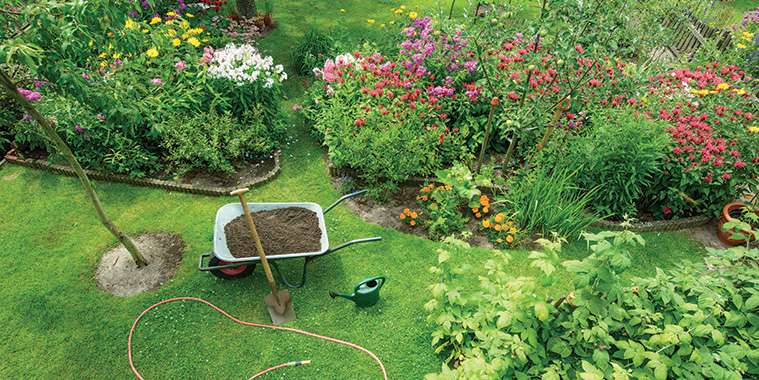By Margaret Heidenry
Having a lush green yard as a retreat is fantastic. But maintaining a yard? Easier said than mowed. So the question then becomes: How can you enjoy your backyard oasis with the minimum of effort on pruning, weeding, and anxiously hovering over every blade of grass?
Since yard maintenance may be looming large over you right about now, here are some smart shortcuts to make the coming warm-weather months way easier.
1. Get your garden tools in good shape
After months in cold, damp storage, your gardening tools can likely use a spring cleaning. To shine rusty tools without elbow grease, soak them in white vinegar for 24 hours, then scrub with steel wool. Keep tools from rusting again by storing them in a bucket of builder’s sand. (It really works!)
2. Water less for longer
Instead of frequently watering your grass lightly, water it only two times per week for longer periods of time.
The reason: Not only will you save water, but this promotes deeper grass-root growth, thus enabling your lawn to better tolerate drought.
Take a cue from a good rainfall to determine how much water your grass needs. About 20 minutes, twice each week, should do the trick.
3. Use old newspaper and never pull weeds again
Weeds in your flowerbeds are a time-stealing eyesore (plus weeds steal moisture from flowers, causing them to wilt). Banish weeds for the entire summer with this simple trick.
Pull all the weeds from your beds once, and then add a layer of newspaper beneath mulch.
Newspaper will block new weeds from taking root, as well as help retain moisture. It is also nontoxic and will eventually decompose into the soil.
4. Kill weeds with vinegar
You can also brew up an all-natural vinegar mixture to keep weeds away. Not only is this hack environmentally friendly, it’s also a safe option for those with pets sniffing around the yard.
Pour 1 gallon of everyday white vinegar into a bucket and add 1 cup of table salt. Stir the solution until the salt dissolves. Add 1 tablespoon of liquid dishwashing soap to help the mixture stick, and you’ve got a powerful weedkiller. Funnel it into a spray bottle and spray liberally on the weeds on a sunny day. Any weeds hit with this solution will die within several days.
5. Shine outdoor furniture
Clean stains on plastic outdoor furniture by rubbing marks with a dab of white toothpaste. Toothpaste’s tiny granules gently clear stains that most other cleaners can’t reach.
If you need to revive sun-faded colors on plastic furniture, polish with a small amount of petroleum jelly or mineral oil. Let the jelly or oil sit for an hour, then wipe it off for a refreshed shine.
6. Prevent pests with pantry items
Instead of using harmful pesticides, repel critters by sprinkling coffee grounds or citrus peels in your garden.
Both are natural repellents for pests, because of their odor and acidity. Bonus: Coffee grounds also serve as a fertilizer and improve a soil’s drainage, water retention, and aeration.
7. Protect your garden from animals and pets
Hate how animals (your own, or intruders) tend to munch on your garden’s offerings before you can get a taste? Some plastic forks can fix that.
Stick plastic forks point-side up around delicate plants. Most animals will steer clear lest they hurt their delicate feet.
8. Keep your roses healthy with milk
Roses are susceptible to unsightly fungus, in the form of blotches on leaves. The answer is in your fridge. Take half a cup of milk and add it to a cup of water in a spray bottle.
Then spray the watered-down milk onto your rose leaves to kill spotting fungus.
9. Skip watering your plants
Always forgetting to water your plants? A hack using plastic water bottles can save you the trouble. Fill them with water, then use a needle or pin to poke a few holes in the cap. From there, half bury the water bottle upside down in the dirt near the plants you want to water. The holes in the cap allow for a slow trickle to keep plants hydrated for as long as a couple of weeks (depending on the size of your water bottle).
10. Mow easier
While most people mow back and forth across their lawn, turning around once they reach the sides, there is an easier way: Mow in a spiral shape, from the inside out. This reduces the amount of turning, which is tough to wrangle with a push mower and all but impossible with a ride-on mower. Here’s more on how to mow a lawn.
11. Don’t bother raking up lawn clippings
Hate raking up your lawn clippings? Leave them on your lawn instead. They’ll help fertilize your lawn and keep it lush. Your best bet is to keep these clippings short enough that they won’t clump on top of your grass, but rather fall to the earth below. A good rule of thumb to make this happen is the one-third rule: Snip just the top third of the blades of grass so they’re small enough to fall through.
12. Make your lawnmower nonstick
A great way to keep cut grass from clogging up your lawnmower’s cutting blades is to use cooking spray on the blades.
This saves a lot of time on cleanup and maintenance, by keeping grass from sticking to the blades.
— realtor.com



